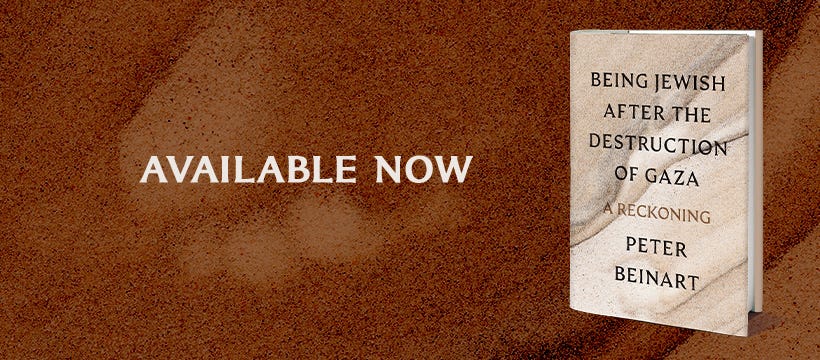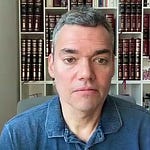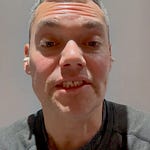I spoke with my friend, political analyst, and president of The Agora Initiative, Khalil Sayegh. Questions included…
How are you able to face this unending horror and maintain such gentleness and generosity?
What do you think of the “perfect victim” critique?
After all this time, what gives you confidence that persuasion is possible, and that changing minds can lead to real-world change?
How do you maintain your faith in God in the midst of so much suffering?
How do you find the right balance between criticizing Hamas and criticizing Israel, given their great power disparity?
How do you respond to the argument that Hamas’s authoritarianism and violence shows Israel can’t afford to give Palestinians equal rights?
Do you believe Hamas accepts the idea of a two-state solution?
What was your response to the assasinations in Washington, DC?
What do you think of the phrase “Globalize the Intifada”?
(Recorded May 25, 2025)
VIDEO TRANSCRIPT
Peter Beinart: I’m really, really pleased to be joined by Khalil Sayegh, someone who I’ve learned a tremendous amount from, who I admire very, very deeply. Khalil is the director of the Agora Initiative, which is an organization that seeks to mobilize the public for a peaceful solution in Palestine and Israel. He’s a political analyst based in Washington, D.C. He is originally from the Gaza Strip. Khalil, thank you so much for doing this.
Khalil Sayegh: Thank you for having me, Peter. Looking forward to our conversation as usual.
PB: So, Khalil, I follow you on social media a lot. And sometimes I watch your social media and I see how closely you are following what is now, I think, harder and harder to deny is a genocide in Gaza. And yet, I also see your tone, which is not just gentle, but I would say often generous and also often very self-critical when it comes to Palestine, Palestinian politics, and activism. And I sometimes think to myself, I don’t think that if I were in your position, being from Gaza, your own father was killed, I don’t think I would be able to maintain that that tone. I don’t know what the hell I would be thinking or doing. But I don’t think I would be able to act the way you are. And so, I just wonder if you can talk a little bit at a personal level, how you absorb this unending horror and handle it the way you do.
KS: Sure, yeah, to start with, I mean, the reality is very harsh. The reality is very difficult to witness every day. And as you just described, I mean, someone like myself, who has not only lost his father and sister in Gaza, but also countless friends and relatives, looking and watching over what’s going on is quite harsh. Just like few hours ago, we’ve witnessed the destruction of a school in Gaza. And literally the bodies were taken out, really burned alive, children and women burned alive in the school. Yesterday, we’ve witnessed the murder of al-Najjar family, kids, the doctor at Nasser Hospital, who was surprised that her kids were brought murdered by the Israeli military. So, in face of all of that, it is really difficult for someone like me to just be here from the outside and looking. You know, there is a constant feeling of guilt that you are not there. There is constant feeling of hopelessness that whatever I do, it seems to not be stopping. And I’ve been trying over and over to do something about it, but it’s not stopping. So that’s how I’d like to start it is that on the emotional level, this is how I feel in a constant way. I am angry. I am outraged. I feel like I scream. I sometimes, you know, close the room or I’m in my car and I just find myself screaming for minutes or two. But when it comes to my contact in public and when it comes to my social media interaction or my personal interaction beyond friends, like my professional interaction, because with friends, you’re more open and you’re intimate. I tend to think twice before I say anything. And that’s something I had to learn over the years. You know, I wasn’t always this way. I had to learn it over the years. And I think always constructively on what this could achieve and how would the other side, the West, that being since we are in the West, can perceive that and how it would change them or not. My perspective has always been that the idea that we can shame the other to feel, you know, pointing out to them and saying, you are so racist and you shouldn’t be racist, it doesn’t really help because once you say someone is racist, you already block the entire conversation. Instead of saying, you know, the Americans always didn’t care about Palestinians, whatever, my approach would be more the Americans don’t know enough and therefore don’t care about what’s happening to the Palestinians because they don’t know. So, I always approach it with this charity, if you wish, that if I teach enough, if I tell them enough, that things would change. That being said, I am not in denial of the reality that we have been saying what we are saying. We have been doing what we are doing, you know, at the Agora Initiative. Our very focus is to break down the story, the story of Palestine in a very mainstream language, in a language that a conservative Christian could understand, an Orthodox Jew could understand, and your average white liberal or a person of color who is also liberal could understand. And still, we are not seeing change. And it is very frustrating. Yet, I don’t see another solution. I don’t see how anger and shouting at the other and calling the other’s name could help change anything.
Listen to this episode with a 7-day free trial
Subscribe to The Beinart Notebook to listen to this post and get 7 days of free access to the full post archives.











